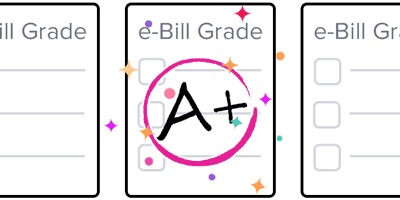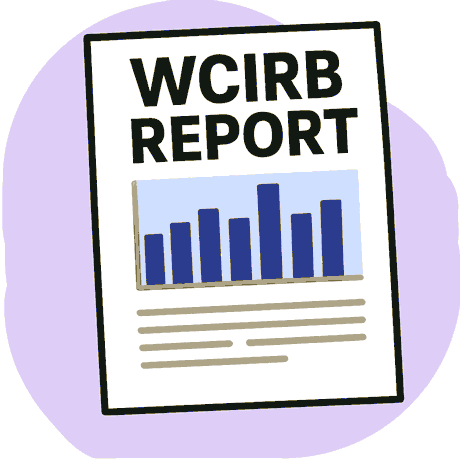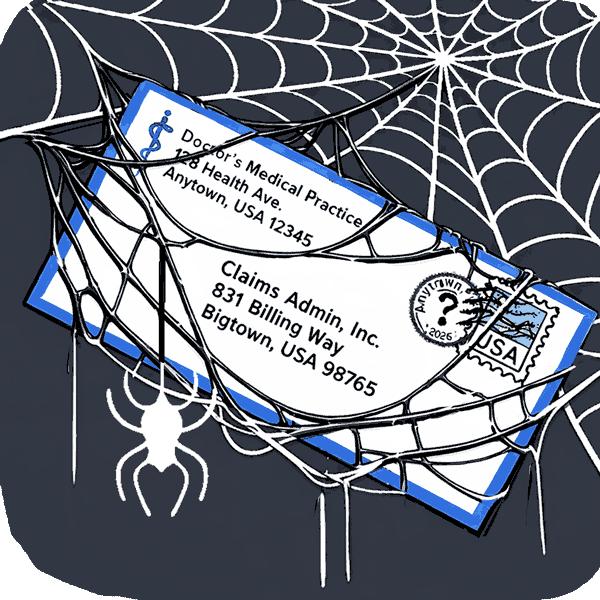e-Billing "Grades" - Top 10 Self-Insured Employers

At daisyBill, we believe in transparency and accountability. That’s why we publicize Electronic Data Interchange (EDI) data from the millions of electronic workers’ comp bills (e-bills) our providers send to over 800 claims administrators (aka payers or carriers) annually.
EDI refers to the exchange of digital files necessary for e-billing, including:
- The actual e-bills (837 files) and supporting documents
- Payers’ formal acknowledgements of receiving those e-bills (277 files)
- Electronic Explanations of Review (e-EORs, aka 835 files)
Our Claims Administrator and Network Directory assigns EDI “Grades” to each claims administrator, evaluating their e-billing performance. Today, we focus on a specific type of claims administrator (or payer): self-insured, self-administering employers that handle their own claims.
These employers directly cover the cost of medical treatment for their injured workers and manage the claims process themselves, assuming full responsibility for their employees’ care.
When these employers fail at EDI, their employees should be concerned; poor EDI performance creates a heavy workload for doctors and other providers, making it even more challenging to accept injured workers as patients.
Below, we list the 10 largest self-insured employers by bill volume in our system, most of which are California employers (a consequence of California being the 4th-largest economy globally and generating the most workers’ comp claims of any state). See how we rank their EDI performances below.
Some employers make it easy for doctors to say “yes” to treating their employees. Others…not so much.
daisyData: Top 10 Self-Insured Employers by Bill Volume
The really bad news: Two of the self-insured employers among our Top 10 (shown above) receive a failing EDI Grade. Providers should reconsider whether treating injured workers for these employers is worth the inevitable billing hassle:
- Marriott (EDI Grade: F)
- The County of San Bernardino (EDI Grade: F)
The County of San Bernardino also fails to process many bills sent by providers, resulting in daisyBill clients needing to submit duplicate bills 20% of the time. Marriott and San Bernardino employees have cause for concern about their access to care in the event of a workplace injury.
The not-great news: Three of our Top 10 self-insured employers have an EDI Grade of ‘C’ or ‘D,’ meaning that any doctor taking on their employees as patients is likely in for some administrative hassle.
- The LA County Metropolitan Transit Authority (EDI Grade: D)
- The City of San Diego (EDI Grade: D)
- The County of San Diego (EDI Grade: C)
The good news: many of our Top 10 self-insured employers do a good (or great) job handling e-bills. Employees of these entities don’t need to worry; doctors can treat them and expect generally smooth sailing when it comes to billing and payment:
- The US Department of Labor (DOL) (EDI Grade: A+)
- The City and County of San Francisco (EDI Grade: B+)
- The City of Los Angeles (EDI Grade: A-)
- The County of Santa Clara (EDI Grade: B-)
- The County of Riverside (EDI Grade: B+)
daisyData Deep Dive: Best-Performing Self-Insured Employers
daisyBill providers bill 235 self-insured employers, both public and private. Our largest by far is the US Department of Labor (DOL), which covers care for federal employees.
The DOL is also our best performer in terms of EDI, consistently accepting and properly responding to providers’ e-bills. This model claims administrator does just about everything right, from timely acknowledging receipt to quickly returning e-EORs and payment.
As the DOL’s EDI Grade breakdown (below) shows, the federal agency excels in all four EDI categories: receiving e-bills, acknowledging receipt, accepting the e-bills for processing, and most importantly, sending e-EORs.
Joining the DOL on the “A” team (albeit with a minus attached) is the City of Los Angeles.
This municipal employer maintains stellar numbers in all but one category. Unfortunately, it’s the category that matters most. Most of the time, the City of LA sends e-EORs. But “most” isn’t enough to give LA more than a B+ in the e-EOR category, dragging the overall Grade to an A-. Respectable, but worth improving.
Honorable mention also goes to the City and County of San Francisco and the County of Riverside, both of which maintain a B+ overall.
daisyData Deep Dive: Worst-Performing Self-Insured Employers
The employers above demonstrate that there’s no excuse for poor EDI performance. The technology is well-established, and several states require claims administrators to accept and properly respond to e-bills by law.
Yet some claims administrators, for reasons unknown, have completely failed to get with the times, burdening providers with needless paperwork and draining practice resources.
Marriott is an unfortunate prime example.
The hotel chain does well in most EDI categories, but rarely sends valid e-EORs. This unacceptable mistreatment of the providers who are (somehow) willing to treat Marriott’s injured employees drags their EDI Grade down to an ‘F.’
Marriott isn’t the only self-insured employer F-ing up. The County of San Bernardino has two issues:
- San Bernardino only began accepting e-bills relatively recently despite state law requiring e-bill acceptance, hence its low ‘837 Sent (e-Bill)’ numbers.
- San Bernardino routinely fails to send e-EORs.
This public employer has no valid reason to perform this poorly, in a state that has mandated e-bill acceptance for well over a decade. Get it together.
Dishonorable mention also goes to the Los Angeles County Metropolitan Transit Authority and the City of San Diego, both of which carry an EDI Grade of ‘D.’
The employers above inexplicably fail or refuse to use widespread, standard, legally required technology to better facilitate the treatment of injured workers. Marriott, San Bernardino, LA Metro, and San Diego have made choices that make it more difficult for providers to accept their employees as patients.
We’ll continue to track and share daisyData on claims administrator EDI performance. Someone has to keep score for the sake of injured workers and the providers who treat them.
daisyBill gives providers fast payment, administrative relief, and visibility into workers’ comp revenue. Click below to see more:
THE DAISY DIFFERENCE
DaisyBill provides content as an insightful service to its readers and clients. It does not offer legal advice and cannot guarantee the accuracy or suitability of its content for a particular purpose.
.gif)





